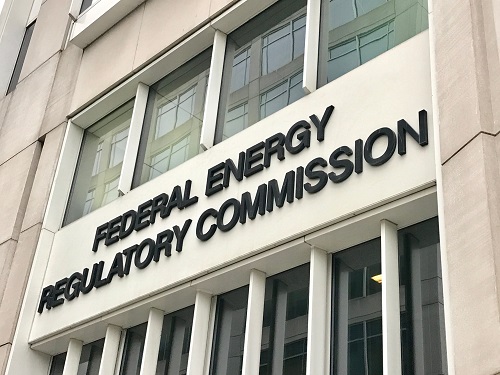March 2023, Vol. 250, No. 3
Government
FERC Moves Forward on Pipeline Rates, Affiliates

By Stephen Barlas, Contributing Editor, Washington, D.C.
(P&GJ) — The Federal Energy Regulatory Commission (FERC) moved forward recently with projected policies with gas pipeline implications. But their resolution is a bit up in the air now that former Chairman Richard Glick has left the commission after failing to be reconfirmed by the Senate. Willie Phillips, another Democratic commissioner, is the new chairman and instead of the 3-2 Democratic majority in 2022, the FERC now has a 2-2 Democratic-Republican split in 2023.
Sarah Tucker, an energy attorney with the law firm Sidley, wrote in a January 23, blog post: “With a deadlocked Commission, a number of agenda items furthered may be left in limbo – at least for the near future. These include a series of natural gas policy statements that the Commission converted to draft form in March 2022, along with power transmission initiatives aiming to respond to capacity and reliability challenges.”
A major difference between Glick and Phillips is that the former had a bee in his bonnet with regard to reducing greenhouse gas emissions in gas pipeline projects, including new compressors, and he sometimes took a prominent adversary role with regard to new pipeline infrastructure. He was viewed as an ally of environmental groups.
Phillips was chairman of the D.C. Public Service Commission when he was appointed by President Joe Biden in September 2021. His background is in electric grid issues. In announcing his appointment as chairman of the FERC, the commission’s press release stated: “Phillips has an extensive background in the areas of public utility regulation, bulk power system reliability, and corporate governance.”
One Washington observer calls Phillips, as opposed to Glick, a “consensus builder” given his technical background and work at places like the National Association of Regulatory Utility Commissioners.
One key decision made by FERC while Glick was still aboard, and which will have ramifications going forward, slightly changed the way the commission views rate change requests made by interstate pipelines.
The filing by Panhandle, an Energy Transfer subsidiary, was noteworthy because it was the first time in 10 years the commission actually litigated a complete rate case. Of course, the natural gas environment has changed considerably in the past decade.
In December 2022, FERC issued an order setting a return on equity (ROE) of 11.25% for Panhandle Eastern Pipe Line Co. Commissioner Allison Clements indicated that she expects the order will “provide important guidance on [FERC’s] approach to natural gas rates in coming years.”
The last NGA Section 4 general rate case to be fully litigated was El Paso Natural Gas Co., a 2013 decision that derived rates based on a test period that straddled 2010 and 2011. The allowed ROE in that case was 10.55.
A blog post from the law firm Akin Gump stated, “FERC policy often uses the ‘last litigated ROE’ as a proxy for just and reasonable rates when it is developing initial rates for existing facilities being acquired by a new pipeline. It has also relied upon the ‘last litigated ROE’ in rulemaking proceedings that concerned pipeline rates. Hence, the Panhandle mark of 11.25 is an increase of 70 basis points and may change the calculation made by pipelines and shippers when they consider whether to litigate a rate case proceeding or agree to a black box settlement without a stated ROE.”
One attorney who practices before FERC states that the Panhandle rate case was a case of “FERC not trying to make waves.” She added that despite the 70 basis-point increase the commission kept its standard of using 35 years as the period over which to measure the economic life of an asset.
Some on the staff or the FERC and from the outside had pushed for extending that period up to 50 years. That would have probably led to lower ROEs for pipelines.
In another recent action, the FERC proposed a policy statement addressing contractual commitments between an affiliate shipper and its parent oil or liquids pipeline transportation company in particular circumstances.
If adopted, it would create a rebuttable presumption that affiliate contracts are unduly discriminatory and not just and reasonable in certain circumstances and require a pipeline to produce additional evidentiary support for affiliate contract rates and terms. This follows a trend of increased scrutiny by FERC on affiliated contracts across all industries it regulates.
FERC proposal was a narrower version of a proposed policy statement issued in 2020 which drew heavy criticism from major oil transporters such as TC Energy and Enterprise Partners Products.
In fact, the question of affiliate relationships has intruded on FERC’s gas pipeline decisions, most recently the Spire STL pipeline in St. Louis which the FERC approved it in 2018.
The Federal Court of Appeals and the Supreme Court both eventually entered the fray as a result of environmental lawsuits but, in December 2022, FERC finally reissued a permanent certificate to Spire STL for operation of the 65-mile natural gas system, which was already in operation, stating the project sufficiently satisfies economic needs in the St. Louis region.
Perhaps more importantly, FERC addressed interstate gas pipeline affiliate relationships more broadly in its March 2022 policy statement, which revised the 1999-vintage pipeline certificate approval policy.
“Further, the Commission concluded that the common practice of utilizing precedent agreements with affiliates of the applicant(s) will ‘generally be insufficient to demonstrate need,’” FERC said. “The Commission stated that it will determine how much additional evidence is required, on top of affiliate precedent agreements, on a case-by-case basis.”
However, the FERC withdrew that policy statement in April 2022 after it garnered heavy criticism, in part because of its perceived negative impact on U.S. natural gas production and supply at the start of the Russian invasion of Ukraine.
On the question of whether FERC revised affiliate policy for oil pipelines improves on its 2020 effort, attorneys in Washington who filed comments for TC Energy (Marketlink and Keystone pipelines) and Enterprise Products (50,000 miles of pipelines NGLs, crude oil, refined products, and petrochemicals) did not respond to requests for comments.






Comments